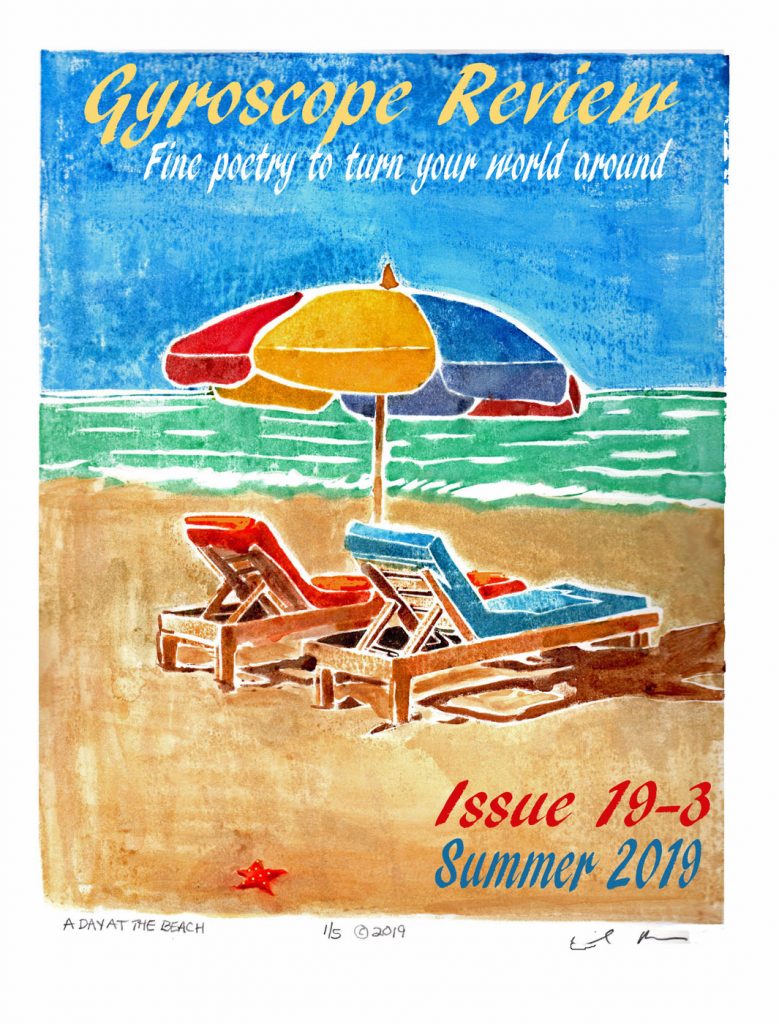Do you remember which poems pulled you into poetry? The ones that dazzled and beguiled you? I was given a book of poems very early by my grandmother and grew fascinated by the rhythm and the words. I was lucky enough to have elementary school teachers that emphasized poetry in their literature lessons. Memorizing a poem gave me a friend to recite in my head whenever I needed. Of course, a steady diet of Shakespeare in high school helped me fall in love with poetry also. Here are the five poems, in no particular order.
First Poem
My grandfather gave me a book that had the following poem in it. Among all the others it stood out. I didn’t live near the ocean, just visited it on vacations, but the poem has such longing and romanticism in it I couldn’t help but be enraptured. I was always reading history and historical novels in school, so this one captured my imagination.
Sea Fever
by John Masefield
I must go down to the seas again, to the
lonely sea and the sky,
And all I ask is a tall ship and a star to steer
her by;
And the wheel’s kick and the wind’s song and
the white sail’s shaking,
And a grey mist on the sea’s face, and a grey
dawn breaking.
I must go down to the seas again, for the call
of the running tide
Is a wild call and a clear call that may not be
denied;
And all I ask is a windy day with the white
clouds flying,
And the flung spray and the blown spume, and
the sea-gulls crying.
I must go down to the seas again, to the
vagrant gypsy life,
To the gull’s way and the whale’s way, where
the wind’s like a whetted knife;
And all I ask is a merry yarn from a laughing
fellow-rover,
And quiet sleep and a sweet dream when the
long trick’s over.
Second Poem
I have a very old copy of the Complete Poems of Robert Frost. I don’t know where it came from or how long I’ve had it, but this poem is bookmarked. It is very evocative and reminds me of Christopher Marlowe’s poems. Of course I love all the classic Frost poems, “The Road Not Taken”, “Stopping by Woods on a Snowy Evening”, “Birches”, “Mending Wall”, and “Nothing Gold Can Stay”.
A Line-storm Song
by Robert Frost
The line-storm clouds fly tattered and swift,
The road is forlorn all day,
Where a myriad snowy quartz stones lift,
And the hoof-prints vanish away.
The roadside flowers, too wet for the bee,
Expend their bloom in vain.
Come over the hills and far with me,
And be my love in the rain.
The birds have less to say for themselves
In the wood-world’s torn despair
Than now these numberless years the elves,
Although they are no less there:
All song of the woods is crushed like some
Wild, easily shattered rose.
Come, be my love in the wet woods; come,
Where the boughs rain when it blows.
There is the gale to urge behind
And bruit our singing down,
And the shallow waters aflutter with wind
From which to gather your gown.
What matter if we go clear to the west,
And come not through dry-shod?
For wilding brooch shall wet your breast
The rain-fresh goldenrod.
Oh, never this whelming east wind swells
But it seems like the sea’s return
To the ancient lands where it left the shells
Before the age of the fern;
And it seems like the time when after doubt
Our love came back amain.
Oh, come forth into the storm and rout
And be my love in the rain.
Third Poem
Then there’s Emily Dickinson. She wove in and out of my early poem reading, and I fell in love with her succinct style that said so much. She’s still one of my favorite poets. Setting Sail, as it got titled somewhere along the way, is one poem I memorized because it speaks to me as a landlubber who finally went out to sea.
Emily Dickinson
VII.
SETTING SAIL.
Exultation is the going
Of an inland soul to sea, —
Past the houses, past the headlands,
Into deep eternity!
Bred as we, among the mountains,
Can the sailor understand
The divine intoxication
Of the first league out from land?
Fourth Poem
I stumbled across High Flight while reading some WWII history. Our family has close ties to aviation, my father worked in the industry. Some vacations we’d drive out to that city’s airport and watch the planes take off and land. There were pilgrimages to the Air and Space Museum. In the Army I even put in to fly helicopters. Alas, my eyesight wasn’t good enough.
John Gillespie Magee Jr., the RAF poet, wrote very few poems during WWII but sent them to his parents in letters. He was killed in a training accident on December 11, 1941. I think of this poem whenever I hear one of my favorite songs – Pink Floyd’s Learning to Fly. Both speak to pilots, astronauts, and wanna be flyers everywhere.
High Flight
by John Gillespie Magee Jr.
Oh! I have slipped the surly bonds of Earth
And danced the skies on laughter-silvered wings;
Sunward I've climbed, and joined the tumbling mirth
of sun-split clouds,—and done a hundred things
You have not dreamed of—wheeled and soared and swung
High in the sunlit silence. Hov'ring there,
I've chased the shouting wind along, and flung
My eager craft through footless halls of air ....
Up, up the long, delirious, burning blue
I've topped the wind-swept heights with easy grace
Where never lark nor ever eagle flew—
And, while with silent lifting mind I've trod
The high untrespassed sanctity of space,
Put out my hand, and touched the face of God.
Learning to Fly video
Lyrics:
Learning to Fly
Into the distance, a ribbon of black
Stretched to the point of no turning back
A flight of fancy on a wind swept field
Standing alone my senses reeled
A fatal attraction is holding me fast
How can I escape this irresistible grasp?
Can't keep my eyes from the circling sky
Tongue-tied and twisted, just an earth-bound misfit, I
Ice is forming on the tips of my wings
Unheeded warnings, I thought I thought of everything
No navigator to find my way home
Unladened, empty, and turned to stone
A soul in tension that's learning to fly
Condition grounded but determined to try
Can't keep my eyes from the circling skies
Tongue-tied and twisted, just an earth-bound misfit, I
Friction lock, set
Mixtures, rich
Propellers, fully forward
Flaps, set - 10 degrees
Engine gauges and suction, check
Above the planet on a wing and a prayer
My grubby halo, a vapor trail in the empty air
Across the clouds I see my shadow fly
Out of the corner of my watering eye
A dream unthreatened by the morning light
Could blow this soul right through the roof of the night
There's no sensation to compare with this
Suspended animation, a state of bliss
Can't keep my mind from the circling sky
Tongue-tied and twisted, just an earth-bound misfit, I
Songwriters: Tom Petty, Jeff Lynne
For non-commercial use only.
Last but not least
Of course, no influence of mine would ever be complete without the main man himself, William Shakespeare. I ran into Shakespeare in high school English class, first in plays we acted out, then through the sonnets. There are many sonnets I like, sometimes it depends on the day and how I’m feeling. But if I had to choose just one, this would be it.
William Shakespeare
Sonnet 14: Not From The Stars Do I My Judgement Pluck
Not from the stars do I my judgement pluck;
And yet methinks I have Astronomy,
But not to tell of good or evil luck,
Of plagues, of dearths, or seasons’ quality;
Nor can I fortune to brief minutes tell,
Pointing to each his thunder, rain and wind,
Or say with princes if it shall go well
By oft predict that I in heaven find:
But from thine eyes my knowledge I derive,
And, constant stars, in them I read such art
As truth and beauty shall together thrive,
If from thyself, to store thou wouldst convert;
Or else of thee this I prognosticate:
Thy end is truth’s and beauty’s doom and date.
You may sense a theme in all these poems. I never realized until I started keeping track of all the poems that moved me. I have a folder, My Great Big Pile O’Inspiration, for when I just need to immerse myself in words I love. How about you? Any poems that have wended their way into your heart?
Other Essays on Poetry
Poetry Submissions for the Rest of Us
Why I Don’t Write Political Poetry




